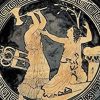Analysis
The meaning of this long, three-sided, lyrical passage has been debated by critics. It seems to serve several functions, all aimed at creating an atmosphere in which the murder of Clytaemestra is dramatically and psychologically convincing. To some extent, the scene is a mystical invocation of the spirit of Agamemnon to aid in the plot for revenge, and, at the same time, a substitute for the funeral obsequies his body never received. It is also an emotional preparation of Orestes for the murder of Clytaemestra. He is already determined to kill her because of the oracle, but the detailed account of Agamemnon’s death and mutilation show him the full magnitude of the crime he is avenging. He, Electra, the chorus — and the audience also — are aroused to the savage fury necessary to condone the slaying of a mother by her son.
The motives of the participants in the plot are clearly defined in this scene. Electra is driven by personal feelings — grief for her father and despair about her own predicament. Orestes is concerned with the loss of his inheritance, the dishonor that casts a shadow over his family’s name, and, most important, obedience to Apollo’s command. The chorus is determined to see that the ancient law of retaliation is upheld.

